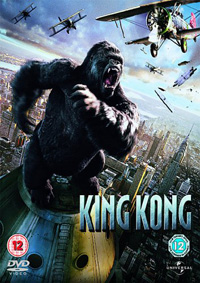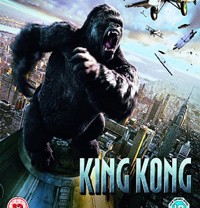 “It was beauty that killed the beast” is one of the greatest lines in cinema and one of the greatest lies. Oh, beauty made the beast vulnerable but it was greed, Karl Denham’s greed for money and fame, that got the beast killed. It has always been one of cinema’s great injustices that in King Kong the Hollywood producer gets the last word to rewrite history for his own ends.
“It was beauty that killed the beast” is one of the greatest lines in cinema and one of the greatest lies. Oh, beauty made the beast vulnerable but it was greed, Karl Denham’s greed for money and fame, that got the beast killed. It has always been one of cinema’s great injustices that in King Kong the Hollywood producer gets the last word to rewrite history for his own ends.
 So, one of the very few reasons to be grateful to Peter Jackson for his overblown remake of one of the greatest science fiction films of all time is that he at least got Denham’s character right. The guy is a scheming, sneaky, lying creep and Black – in a performance of twitchy insincerity – is almost perfect. Of course the iconic line is still there, and Denham still gets to say it, but it feels even more like an unconvincing, tacked on afterthought – another bit of Denham’s bullshit – than it did in the original.
So, one of the very few reasons to be grateful to Peter Jackson for his overblown remake of one of the greatest science fiction films of all time is that he at least got Denham’s character right. The guy is a scheming, sneaky, lying creep and Black – in a performance of twitchy insincerity – is almost perfect. Of course the iconic line is still there, and Denham still gets to say it, but it feels even more like an unconvincing, tacked on afterthought – another bit of Denham’s bullshit – than it did in the original.
There are a few other positives in Jackson’s remake. There are some nice running jokes – especially Chandler’s vain Bruce Baxter and his unerring ability to know when to run for his life. The return to New York, with the characters fractured and scattered, is particularly nicely handled and a car chase through New York is exceptionally well done.
The special effects are spectacular and the action sequences enormous. There is no denying that this Kong is as great a technical wonder as Willis’s stop motion version in the original, and the whole of Skull Island vibrates with tremendous energy. The recreation of depression-era New York is perhaps even more successful. But King Kong suffers from the same problem that afflict Jackson’s earlier Lord of the Rings films – he is a director who has no concept of when less is more.
The original film had one dinosaur fighting Kong? Fine, we’ll have three! And we’ll tangle them all up in a ridiculously over-extended mid-air battle. Why? Because more must be better!
Nor can Jackson pick a single dramatic shot to make his point. Instead he batters the viewer into submission by showing you the same fantastic thing over and over again from every conceivable angle. You can almost hear him screaming “Feel awe! Feel awe!” from behind the screen as he overplays every money shot.
There are times in King Kong when this approach simply fails. Jackson’s inability to resist flashy, twitchy editing entirely ruins Kong’s first appearance. The stampede scene, however expensive the effects, does not convince as the actors and the scrambling dinosaurs fail to mesh on the screen. And though, as a long-standing Kong fan, I have often dreamed of seeing the spider-pit sequence, I thought this version bordered on the pointless – perhaps it was right to confine it to the cutting room floor in the first place.
But my biggest problem with Jackson’s King Kong is the way he sentimentalises the great beast. From the ludicrous, misconceived and frankly embarrassing comedy routine with which Darrow (Watts – no Fay Wray she, not even Jessica Lange) “entertains” Kong to the cringe-inducing “ice-skating” sequence, Jackson makes his Kong cuddly and cute and sympathetic. I half expected to see Jackson put a silly hat on his “monkey” and get it to do tricks – perhaps it’s on the DVD and the inevitable “director’s cut” – as if he’s cut anything from this bloated mess.
It is entirely wrong that Darrow should laugh and play with Kong. Kong should be a wild and dangerous animal – the king of his domain – not some franchise-friendly, cartoon gorilla or circus chimp. Darrow certainly shouldn’t be wandering the streets of New York seeking the beast, or cuddling up to him like a love sick teenager. It’s ridiculous and it is wrong.
Of course Kong should end up as the object of our admiration. Through the telling of this story we should come to respect and even empathise with this great, alien beast – his fate is caused not by his own failings but by those of greedy men. But Jackson can’t resist wanting to make us like Kong, sympathise with him and even pity him. It’s a terrible mistake. It diminishes Kong, making him predictable and shows no respect for his animal nature. It also cheapens the iconic final scenes. At the point when our hearts should be pounding with the injustice of it all, Jackson turns the moment into a weird love scene, like the ending of Titanic but with less ice and more fur. It’s a farrago and I couldn’t stop myself laughing.
I love the original King Kong and there are certainly moments of Jackson’s version which I admire. But Jackson’s understanding of what is important about his central character, Kong, is fundamentally flawed and the spectacular set-pieces that pad out the inflated three hour running time fail to disguise the thematic flaws at the core of what, in the end, is a silly and overly sentimental film.
